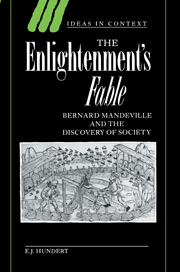Book contents
5 - Imposing closure — Adam Smith's problem
Published online by Cambridge University Press: 23 November 2009
Summary
At the time of his death in 1790, Adam Smith, the former professor of Moral Philosophy at the University of Glasgow, had begun to achieve international prominence as the author of An Inquiry into the Nature and Causes of the Wealth of Nations (1776). In this masterpiece, Mandeville's name appears only once in a critical aside about foreign trade, and Smith's frequent oblique allusions to The Fable would have been apparent only to those colleagues together with whom Smith confronted Mandeville's challenge to the moral legitimacy of commercial society. When considering Smith's deliberate effacement of The Fable's importance for his analysis of commercial modernity — a characteristic reticence, evident with regard to almost all of his other intellectual debts — it is tempting to assume that he was simply following in the footsteps of Condillac and Helvétius, who plausibly suspected that an open acknowledgement of Mandeville would prevent their own work from receiving a proper hearing. Marx, probably unaware that Dugald Stewart, Smith's former pupil and successor at Glasgow, had already revealed these connections, seems to have held this view, noting with some relish in his discussion of the division of labor in Capital that
[t]he famous passage [on the division of labor in Book I.i of The Wealth of Nations] … which begins with the words, “Observe the accommodation of the most common artificer or day-labourer in a civilised and thriving country,” etc., and then proceeds to depict what an enormous number and variety of industries contribute to the satisfaction of the needs of the ordinary worker, is copied almost word for word from the “Remarks” added by B. de Mandeville to his Fable of the Bees, or Private Vices, Public Benefits.
- Type
- Chapter
- Information
- The Enlightenment's FableBernard Mandeville and the Discovery of Society, pp. 219 - 236Publisher: Cambridge University PressPrint publication year: 1994



